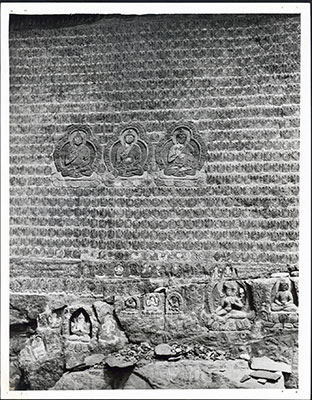
1998.131.226 (Print black & white)


1998.131.226 (Print black & white)

Frederick Spencer Chapman
Frederick Spencer Chapman
September 8th 1936
Lhasa > Lingkhor
1998.131.226
258 x 203 mm
Print gelatin silver , Enlargement
Donated 1994
Faith Spencer Chapman
British Diplomatic Mission to Lhasa 1936-37
Frederick Spencer Chapman
C.4.9 [view film roll]
SC.T.2.226
Manual Catalogues - Caption in Chapman's hand-written list of negatives made whilst on the Mission to Lhasa, 1936-7 [See PRM Manuscripts Collection]: 'Details of multiple minute rock paintings'; PRM Manuscripts Collection: ‘List of Tibetan Prints and Negatives’ - Book 1, From Gangtok to the Natu La August 1936: ‘10/4 - Sheep beside Dochen lake’ // PRM Manuscripts Collection: ‘List of Tibetan Prints and Negatives’ - Book 4: ‘29/1 - Thousands of Buddhas carved and painted on rock at Lhasa’ [MS 16/03/2006]
Exhibition - This image appeared in the 2003 Temporary Exhibition at the Pitt Rivers Museum "Seeing Lhasa: British Depictions of the Tibetan Capital 1936-1947"
Other Information - Related Images: It has been possible to identify this image as being originally referenced 'C.4.9' by cross-referencing the image with a print that appeared in the draft album made available to the PRM for the "Seeing Lhasa" exhibition in 2003. Images prefixed with 'C.4.' comprise a group of negatives containing images of soldiers, turning prayer wheel, horns and rock paintings, paintings, Dr Morgan and mission hospital, beggar with skull and drum, monks outside Sera, meat sellers and water tanks [MS 16/03/2006]
Other Information - Description: Chapman gives an extended description of sights on the full Lingkhor circuit around Lhasa and the Potala in his book Lhasa the Holy City [Chatto & Windus, 1938; reprint, London: Readers Union Ltd., 1940, pp. 160-70]. [MS 16/03/2006]
Other Information - Cultural Background: The Lingkhor (or outer circumambulation route) around Lhasa is regularly walked by pilgrims and other Tibetan Buddhists as a merit accruing act. These carvings (located on the route near the Medical College at Chakpori) depict a thousand Buddhas interspersed with three larger images of Sakyamuni Buddha which were painted red, blue and gold. Devotees would spin prayer wheels, recite mantras or perform full-length prostrations along the path, stopping at key points such as this to carry out other activities. At this particular site the forehead would be placed onto a Buddha image, a finger placed inside a hole or the pilgrim would crawl under the slab of rock at the foot of the wall. [CH 2003]
Other Information - Cultural Background: Pilgrims Would Circumambulate The Lingkhor (approx 6 Miles in total) And Then The Barkhor (often prostrating themselves all the way) until arriving at the Jokhang . The Carvings Along This Part Of The Lingkhor Have Been Commented On By Many Earlier Travellers To Tibet. There Is A Repetitive Carving Of Many Buddhas (based on the theme of The Thousand Buddhas) and 3 Slightly Larger Carvings Of S akyamuni Buddha in different mudra . [Marina de Alarcón ZF 1995.1]
For Citation use:
The Tibet Album.
"Buddha images carved into rock face"
05 Dec. 2006. The Pitt Rivers Museum.
<http://tibet.prm.ox.ac.uk/photo_1998.131.226.html>.
For more information about photographic usage or to order prints, please visit the The Pitt Rivers Museum.
© The Pitt Rivers Museum